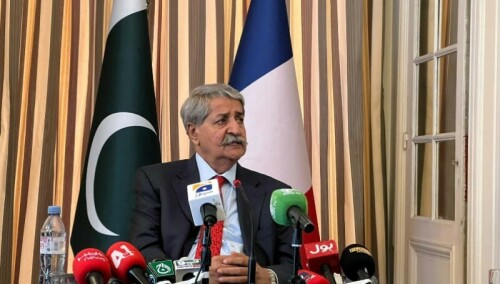KARACHI, Nov 19: The Pakistan government should declare the Astola Island a marine national park and take urgent steps to conserve what is left of this precious natural resource having a great ecological and economical value.
The co-director of Marine Conservation International, Edinburgh, Scotland and DelPHE coordinator Pakistan, Dr Rupert Ormond, made this point at a seminar, Marine biodiversity conservation: a key to the human livelihood, organised by the Centre of Excellence in Marine Biology, Karachi University, in collaboration with the British Council, Karachi, on Monday.
The seminar marked the launch of a DelPHE project, designed to enhance the capacity of participating institutions from Pakistan and Bangladesh to asses, monitor and manage biodiversity for conservation and develop eco-friendly aquaculture and fisheries technology by utilising the UK expertise. The project is funded by the Department for International Development, the UK.
Narrating his account of the hard corals and reef fish assemblage in Pakistan, Dr Ormond said older scientific literature usually showed no existence of coral or coral reefs in Pakistani waters, though these were abundantly found in the adjacent areas like the Gulf of Kutch, Gujarat, India and Oman.
However, he said, studies in some recently released reports showed the existence of coral patches along the Makran Coast at the Astola (Haftalar, local name) and around Churna islands. Coral reef ecosystems were vital to the survival of world’s fisheries as they supported enormous biodiversity and provided revenue to local communities, he added.
“In our survey of Balochistan coastal waters, we found 32 species of hard corals and 80 species of reef fishes. Their concentration was large at the Astola. This is perhaps owing to what we can say ‘the icing of the cake’ as there is a wealth of systems including the mangroves and pelagic fish population that needed to be studied. We also found highly diverse fossil corals in Gwadar,” he said while suggesting Pakistani officials to declare the island a marine national park and protect the best remaining coastal areas from the adverse impacts of development.
Dr Ormond warned, “If immediate measures were not taken, this precious natural resource would be extinct within the next 10 years.”
He said that Astola, which was not only a home for bird, fish and coral species and the associated habitat but also a breeding place for turtles along the Makran coast near Pasni, could suffer damages by the use of dangerous fishing nets, the fishermen collecting corals, lobsters and turtle eggs, besides the adverse impacts of development.
Giving a presentation on Shrimp fisheries and farming in Pakistan, Moazzam Khan of the Marine Fisheries Department said the shrimp industry had witnessed a major slump over the past five years. He said the annual catch had reduced from 25,000 tons of large-sized shrimps to 16,000 tons and 17,000 tons, which comprised 70pc small-sized shrimps, Kiddi.
“The shrimp habitat has been destroyed completely and the main activity left now is to catch trash fish,” he said, citing over-exploitation, stagnant international market, EU ban on exports and fierce competition with cultured shrimp as the reason for the poor catch.
Talking about the progress of Bangladesh in fisheries, DelPHE coordinator for Bangladesh Dr Maruf Hossain said that the second most important source of foreign exchange was fisheries.
In 2001-02, he said, the country achieved the highest ever export earnings from the fisheries sector of which 89 per cent was derived by exporting frozen processed shrimp. Pakistan could learn a lot from the experience of Bangladesh that stood among the top eight shrimp producing countries, he said, adding that the major chunk (i.e. about 95pc of the total fisheries) came from small scale farmers.
Highlighting the need for research in aquaculture in Pakistan, DelPHE coordinator for the UK, Anton Immink, said economic value was important in any research and aquaculture was very productive from that perspective. Investment in indigenous species and good practices was the key to rewarding aquaculture business.
Dr Pirzada Jamal Siddiqui of the KU’s Centre of Excellence in Marine Biology talked about the institution’s educational linkages within the country and abroad. He said staff and students were trained in biodiversity conservation under the collaborative educational programmes.
Dr Ikhlaq Ahmed, Syed Mashood Rizvi, Dr Itrat Zehra, Dr Moazzam Rabbani, Dr Ghazala Siddiqui and others addressed the seminar.















































Dear visitor, the comments section is undergoing an overhaul and will return soon.